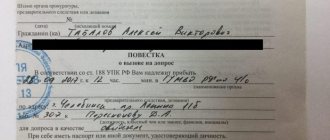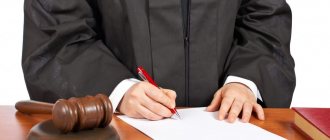New edition of Art. 307 of the Criminal Code of the Russian Federation
1. Knowingly false testimony of a witness, victim, or the conclusion or testimony of an expert, testimony of a specialist, as well as deliberately incorrect translation in court or during pre-trial proceedings -
shall be punishable by a fine in the amount of up to eighty thousand rubles, or in the amount of the wages or other income of the convicted person for a period of up to six months, or by compulsory labor for a term of up to four hundred eighty hours, or by corrective labor for a term of up to two years, or by arrest for a term of up to three months.
2. The same acts, combined with accusing a person of committing a grave or especially grave crime, -
shall be punished by forced labor for a term of up to five years or imprisonment for the same term.
Note. A witness, victim, expert, specialist or translator are exempt from criminal liability if they voluntarily, during pre-trial proceedings or trial, before a court verdict or court decision, declared the falsity of their testimony, conclusion or knowingly incorrect translation.
Expert subscription, its meaning and registration procedure. Expert's responsibility
As is known, a forensic expert is a procedurally independent and independent person.
Expert independence is the most important component in the activities of both state and non-state experts.
Only an independent expert can make a fully objective opinion while assisting justice.
Procedural independence provides a range of rights and responsibilities to the expert, which guarantee the proper conduct of the examination.
The guarantor, in this case, is a properly prepared Expert Subscription.
Subscription from an expert, how not to admit your own incompetence
Analyzing judicial practice, I increasingly come across cases where it is a subscription executed with significant violations that gives the court grounds to declare the examination unacceptable.
It has no legal force and is not evaluated together with other evidence in the case.
Think about it, an examination has been carried out, the expert gives a signature, but ignorance or misunderstanding of procedural norms leads to the fact that the examination cannot be used for proof.
This circumstance may lead to release from criminal liability and punishment.
Signing up for a forensic expert
After receiving the decision to appoint an examination, the head of the expert institution entrusts it to a specific expert who has knowledge sufficient to answer the questions posed.
The law, if we are talking about a state expert institution, obliges the head to explain to the expert his rights and obligations, as well as responsibility for giving a false opinion.
As a result, a subscription is prepared containing the corresponding text with links to legal acts and the expert’s signature.
It follows from the meaning of the law that the expert’s signature on the signature must be completed before the examination begins. Directly when commissioning the examination.
Only after clarification of the provisions of Art. 16, 17 73-FZ and 307 of the Criminal Code of the Russian Federation and giving the appropriate subscription, the expert can begin the examination.
Based on this, I recommend preparing the expert’s subscription separately from the text of the conclusion.
Expert subscription sample
Typical mistakes in preparing an expert subscription
The expert’s signature for clarification of rights, duties and responsibilities was received after completion of the examination. Not on the day when the examination was received for production. This error is typical for the style of registration of a subscription together with the text of the conclusion.
The subscription is attached to the second copy of the expert’s report for comprehensive storage, without sending it to the person who appointed the examination.
The subscription does not indicate who explained the rights, duties and responsibilities of the expert. It is indicated that, in accordance with the duties of the head of the expert institution, the rights, duties and responsibilities are explained to the expert.
A circle of persons has been established who can explain the rights, duties and responsibilities of the expert.
The court, the head of the expert institution, the investigator and the notary have the right to explain these provisions to the expert.
A typical mistake in obtaining a subscription in this case is that the resolution on the appointment of an examination instructs the head of an organization that does not carry out expert activities to warn the expert of responsibility.
Expert's responsibility
The criminal liability of an expert for giving a false opinion is prescribed in Art. 307 of the Criminal Code of the Russian Federation.
By preparing a subscription and putting his signature under its text, the expert is fully aware of the level of responsibility for the examination he conducts.
For example: having established that the signature was made by full name, the opposite, distorted conclusion is given. The document has changes in the original content, and the conclusions indicate that the document has no changes in content.
If such facts are discovered, the expert is subject to punishment in the form of a fine of up to 80 thousand rubles or an amount equivalent to six months’ income.
A more severe punishment is arrest for 3 months or up to five years in prison for a serious or especially serious crime.
Or he is completely released from liability by reporting the falsity of his conclusion until a decision is made by the court.
How to hold an expert accountable
The court and the participants in the process are guaranteed to receive an independent and comprehensive examination.
Conclusions must contain substantiated and reliable answers to the questions posed.
However, there are cases when one of the parties does not agree with the quality and reliability of the conclusions of the examination.
The party has the right to petition for a re-examination and even for bringing the expert to criminal liability.
If the procedure for ordering a re-examination is clear, the picture is clear.
After a review has been carried out, which reveals gross violations of the law and unfounded conclusions, a petition is made to order a re-examination, which is considered by the court.
The process of proof and prosecution under Article 307 of the Criminal Code of the Russian Federation is very labor-intensive. Significant circumstances must be established.
Responsibility begins from the moment the conclusion is prepared. It must be performed only within the framework of a specific case.
Actions are not punishable when the decision to appoint an examination was appointed by an unauthorized person or the expert was improperly appointed, or was not warned at all about criminal liability.
The expert acts with direct intent, giving a deliberately false conclusion. Realizes that he is providing false information to the person conducting the proceedings. Wants to give such conclusions, presenting them as reliable.
Reporting false information due to lack of professionalism or a tendency to fantasize does not incur liability for the expert in this case.
Knowledge is proven based on data collected operationally.
Such as: listening to telephone conversations, operational experiment, obtaining computer information.
Or a comprehensive analysis of the controversial conclusions of examinations in similar cases that were carried out by this person.
In conclusion , compliance with the procedural procedure for registering a subscription is one of the guarantors of the admissibility of an expert’s opinion as evidence. And the possibility of prosecution for giving a false expert opinion.
If after reading this article you realized that you need advice from a forensic expert or a forensic examination, click CALL or on social networks.
I will be glad to help you with answers to your questions.
Related articles:
- who is a forensic expert?
- how to choose a forensic expert.
- What is the difference between an expert and a specialist?
- amendments to Art. 307 of the Criminal Code of the Russian Federation their effectiveness.
Examples from judicial practice
Example one: Gr. B. during the investigation of a theft from an apartment, trying to create an alibi for his friend, Mr. D., assured the investigation that this citizen was fishing with him. During further investigation, it turned out that Mr. B. gave deliberately false testimony. For this he was prosecuted under Art. 307, part 1, with a fine of 20 thousand rubles.
Example two: Citizen P., being in a deeply hostile relationship with her neighbor in the stairwell, gr. R. accused him of pushing her at the entrance to the entrance; she fell and broke her arm. During the investigation, thanks to a security camera installed at the entrance, it was established that gr. P. fell without assistance, slipping on the ice. The court accused the citizen of giving false testimony and brought her to justice under Art. 307, part 1 with payment of a fine in the amount of 80 thousand rubles.
Any questions you may have can be asked in the comments to the article.
In what cases is an expert opinion required?
An examination is a study carried out by a person with special knowledge in a particular field, such as science or technology. People turn to him for help when making various kinds of decisions or due to legal requirements requires obtaining narrowly focused special knowledge and conclusions, for example:
- when accepting goods or results of work performed under the Federal Law on the contract system in the field of procurement for state/municipal needs No. 44-FZ dated 04/05/2013;
- in a dispute about the reasons for the occurrence of product defects (clause 5 of article 18 of the Law on the Protection of Consumer Rights No. 2300-1);
- during the examination of design documentation (Article 49 of the Town Planning Code of the Russian Federation);
- when considering a dispute in court.
Often the need to obtain an expert opinion is encountered when considering court cases. Current legislation in both civil and criminal proceedings provides for the possibility of appointing an examination as one of the evidence in the case. When appointing an examination, issues that are subject to expert consideration and assessment are determined, and the expert is warned for giving a knowingly false conclusion about criminal liability under Art. 307 of the Criminal Code of the Russian Federation. The warning is given in writing before the examination begins. The conclusions contained in the final document based on the results of its conduct are assessed by the court along with all the circumstances of the case.
Who is an expert
According to Art. 57 of the Criminal Code of the Russian Federation, an expert is a specialist in a particular field of knowledge who is appointed by the court to conduct an examination and draw up a conclusion. When performing his functions, he has the right to familiarize himself with the case materials, request additional information, file complaints against the actions (inactions) of authorized persons, give opinions within his competence, refuse to give an opinion if he has a sufficient amount of information, etc.
At the same time, the specialist cannot independently negotiate with the participants in the process, collect materials and knowingly give false testimony.
Find out what a forensic expert's conclusion is in the following video
Providing false information to the tax office
The corpus delicti under Art. 199 of the Criminal Code of Russia, consists of evading an enterprise or individual entrepreneur from paying taxes/duties by failing to provide a declaration or other documents that must be provided in accordance with the legislation of the Russian Federation, or by entering into a declaration or other tax documentation knowingly false information when committing evasion in this way large size.
The objective side is the deliberate inclusion of false information in tax documentation. Other (except for the declaration) documents mentioned in Art. 199 are the documents provided for by the Tax Code of Russia and other documents adopted in accordance with this Federal Law Code, which act as the basis for calculating taxes/fees and for paying them.
| Pass during quarantine | Payment and registration of sick leave during quarantine |
| Article 6.3 of the Code of Administrative Offenses | Article for violating the self-isolation regime |
- Didn't find the answer to your question? Find out how to solve exactly your problem - call right now:
- Federal number -
- Moscow region, Moscow -
- Leningr. region, St. Petersburg -
- It's absolutely free and fast!









